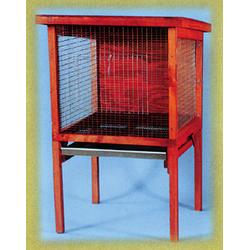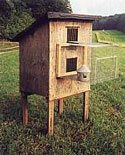Serving the Hobby...
Since 1998!



Why Raise Pigeons & Doves
Why Raise Pigeons
Throughout our country, there are thousands of
people who are pigeon fanciers. We feel that our hobby
is a great way to spend leisure time and many fanciers
feel that the stress of their everyday lives seems to
disappear after they've visited with their pigeons.
Fanciers come in all ages and from all walks of life,
but they share a common bond - their love of pigeons.
Young people have discovered that their pigeons have
provided them with something valuable to do with their
spare time and they also learn responsibility while
caring for their pigeons. The NPA has an excellent Youth
Program that can assist them in locating breeding stock
and their quest for information.
Background
Pigeon history dates back over 5000 years where
pigeons and doves are mentioned several times in the
Bible, the dove being an emblem of the Holy Spirit
(Mathew 3:16) and representing purity (Luke 2:24). The
pigeons of today are descendants of the wild Blue Rock
Pigeon or Dove, Columbia Livia, which still inhabits
coastal regions of Europe, North Africa and Asia.
Aren't Pigeons Dirty & Can't They
Spread Diseases
Unlike the feral pigeons that are found in
cities and farmlands, domestic pigeons are housed in
healthy environments and if given the chance, will bath
everyday. Fanciers take pride in the appearance and
health of their pigeons. Studies have proven that
raising pigeons is no more of a health risk than raising
any other animal or bird.
Where Can I Buy My Pigeons And How
Much Do They Cost
Prices for pigeons range from a few dollars to
hundreds of dollars. We recommend that you start with
only a few and that you purchase them from a reputable
breeder. Attend a pigeon show where you will be able to
see scores of breeds.
Feed
The diet of pigeons and doves is grain, usually
mixtures of peas, corn, wheat, milo and salfflower.
Pigeon pellets which include most grains in a
concentrated form are popular. Grit is an essential to
good health, helping to break down the whole grain for
digestion and providing trace minerals. No grit is
required when feeding pellets. Clear water should always
be available. This provides a convenient method of
medicating as most modern medications are made water
soluble. When provided with a commercial pigeon feed,
pigeon grit and clean fresh water it is possible to
maintain a flock of pigeons in outstanding condition and
top health.
Where Can I Keep My Pigeons
Pigeons are usually kept out doors in buildings
called "lofts". Lofts can be small or large, but they
must provide the pigeons with a dry, draft free
environment. Pigeons are hearty, adaptable birds that
thrive under a wide variety of conditions. Whatever
quarters you provide should be airy and well ventilated,
but not drafty. While some pigeon hobbyists have
elaborated lofts which match the color scheme of their
homes, other lofts are modest and functional. The
important thing is that the birds are protected from the
elements while providing some much needed sunlight. To
ensure that the birds are not overcrowded, allow at
least two square feet of floor space per bird. This will
help to build a comfortable and healthy environment and
will allow the birds to flourish.
Help in Starting
The domestic pigeon and dove hobby is worldwide
and is supported be fanciers from all walks of life.
Contact one of our members to receive further
information on joining the hobby and how you can start
enjoying the pleasures and challenge of pigeons and
doves.

Picture of an ideal beginners loft.
This small rabbit style coop will hold
up to 1 pair of pigeon or doves.

Picture of a homemade
small pigeon & dove loft.

Picture of an advanced pigeon loft.